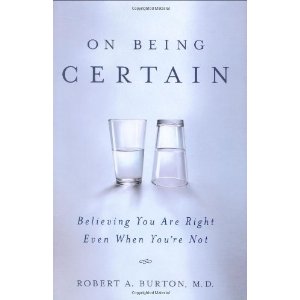I guess you might get a feel for the thesis of this book from the following from the pen of neuroscientist Dr. Robert A. Burton M.D.: “Certainty is not biologically possible. We must learn (and teach our children) to tolerate the unpleasantness of uncertainty.” P.223.
This book surpassed any expectation I might have held when I selected it for consumption. Burton is an expert in the science of how we think we know what we may know. This volume dispels many commonly held myths and provides insight into the current state of the field. It is a gem. The thesis of this book is straightforward: “The message at the heart of this book is that the feelings of knowing, correctness, conviction, and certainty aren’t deliberate conclusions and conscious choices. They are mental sensations that happen to us.” P. 218
Here are a couple of carats:
“I often wonder if an insistence upon being right might have physiological similarities to other addictions, including possible genetic predispositions? We all know others (never ourselves) who go out of their way to prove a point, seem to derive more pleasure from final answers than ongoing questions, and want definitive one-stop-shopping resolutions to complex social problems – and unambiguous endings to movies and novels. In being constantly on the lookout for the last word, they often appear as compelled and driven as the worst of addicts. And perhaps they are. Might the know-it-all personality trait be seen as an addiction to the pleasure of the feeling of knowing?” (p.98).
“One of the overriding fears of our time is that excesses of belief may destroy civilizations” .p.180.
What happens to us when we believe what we claim to know with certainty? Are their consequences? What does history say? What are the facts from the frontiers of science today?
In this book, Dr. Robert A. Burton M.D. provides the “diamond in the rough.” A tremendous contribution – Easily devoured by a wide audience. I heartily recommend it.



